Since first posting on Hebrew tattoos, I have been innudated with requests for advice for proper spellings, etc. I don’t really mind that much; but I find it quite surprising how many people are thinking of getting Hebrew tattoos. In addition, every once and a while I follow the searches for Hebrew tattoos that brought people to my site to see if I can find more incorrect ones. I did this just the other day and found quite a number of tattoos which had a number of errors. So without further ado, here is another installment of…
Hebrew Tattoos You Don’t Want
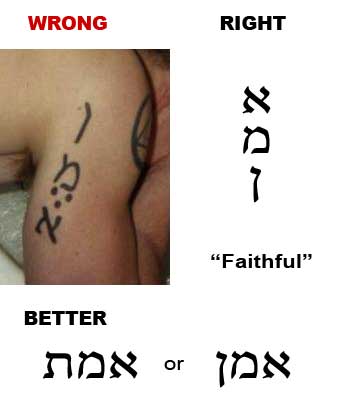
This tattoo is supposed to say “faithful” (from bottom to top), though the vowel pointing is incorrect (there is a segol — the three dots — between the alef and the mem, but no vowel between the mem and final nun). I imagine the word that the poor individual was trying to write was something like ×?ֹמֶן, though I am not certain. I personally don’t think it looks very good vertically, and if I was going to put it vertically I would write it top to bottom (as my example). I would put it horizontally as indicated by my “Better” example (I would also lean towards the word ×?מת if I wanted to indicate faithful).
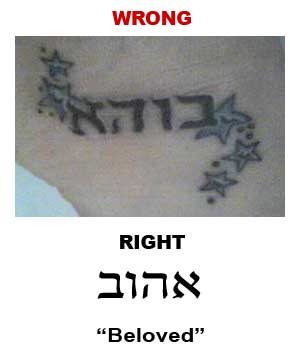
This tattoo is supposed to say, “Beloved.” The word that the woman was trying to have inscribed on her wrist (I believe) was the Qal passive participle of the biblical Hebrew word for love, ×?הב. The problem is that it was written backwards (remember, Hebrew is written from right to left!). I am also not sure that this is the best word to use if you want to say “beloved,” but that’s neither here nor there.
Now it seems as if “beloved” is a fairly popular Hebrew tattoo. If you are looking for the Hebrew spelling, you have to beware of who you ask. I found this image posted on the Christian Tattoo Association web board as alternatives for someone wanting the Hebrew for “beloved”:
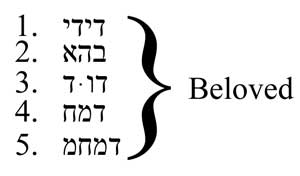
The problem with this advice is that it is riddled with errors:
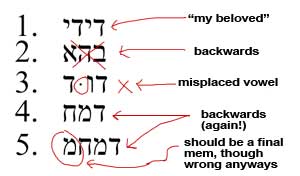
As it turned out, the fellow who posted this advice recognized his error, but he never did repost a correct version (and you had to read through a lot of posts before you saw his comment about the Hebrew being backwards).
I have been asked a number of times for the correct spelling of “beloved” — with most people wanting the beloved that comes from the Song of Songs (e.g., Song 1:13, 14, 16, 2:3, 8, 9, 10, 16, etc.). In English the term “beloved” is a unisex term of endearment. The word in Hebrew, however, is not. The Hebrew word for beloved, דוד, is appropriate only if you are referring to a male (the word also means uncle). You shouldn’t really use it if you are referring to a female (which was David Beckham’s mistake). For a female term of endearment roughly equivalent to “beloved” I would probably suggest ×?הובה, which is based on the Hebrew root for love. I find that many Christians want to tattoo “beloved” in the sense of “beloved of God,” i.e., loved by God. For this sense I would probably suggest the passive form of the verb for love in Hebrew: ×?הוב. This is what I would suggest:
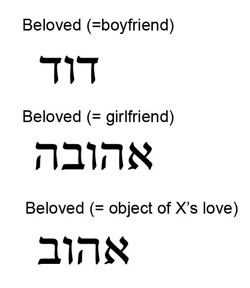
The same fellow that gave advice on the Hebrew for beloved, also gave some incorrect advice on the spelling of “child” in Hebrew on the same web board:
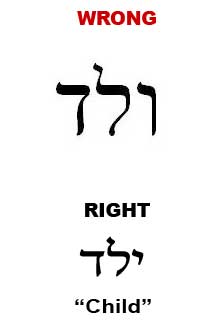
This guy’s track record isn’t that great! I sure hope he isn’t a tattoo artist!
All this goes to show that you should be very careful before you decide to permanently inscribe something on your body in a language that you don’t know. Perhaps the Mishnah is correct in prohibiting tattoos due to their lasting and permanent nature (see m Makkot 3.6).








